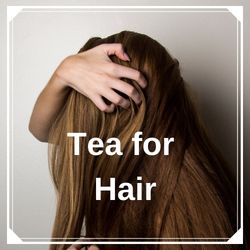The Right Tea Newsletter
–
Issue #41 - October 2021
Welcome to the latest issue of The Right Tea Newsletter!
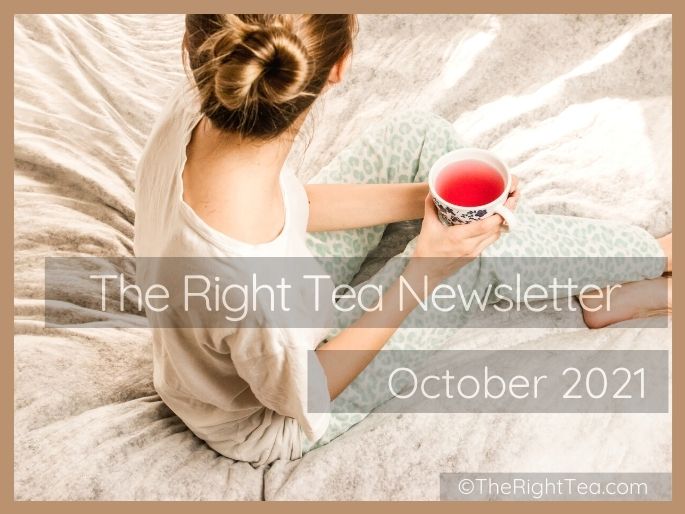
With so many months in lockdown, not all of us have made it to the hair salon as regularly as before, either due to restrictions or to our own priorities. Meanwhile, your hair has grown and it is not looking as pretty or as healthy as before.
Sure, trimming or styling your hair at home may be possible, but there are other ways that you can help your hair to stay moisturized and nourished.
In this issue we will be looking at herbal teas that you can either drink or apply directly to your scalp and hair to slow down the damaging effects of time.
Let’s begin!
Top 5 Herbal Teas for Great Hair!
There are many herbal teas that are said to make your hair looking great, strong and growing fast. Many of these herbs often make it into your hair products in the form of extracts.
These are some teas that you may enjoy not drinking on a daily basis to keep your scalp and hair follicles healthy from the inside, but that you can also use as rinses to nourish your hair from the outside.
Chamomile
(anthemis nobilis and matricaria recutita)
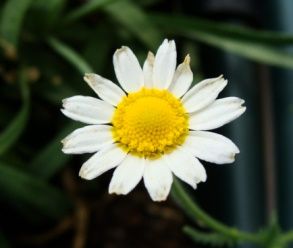
Chamomile tea is made from the leaves and daisy-like flowers of this herb. Often chosen for its calming and digestive nature, drinking this tea may also improve the health of your skin, by driving out toxins that cause infections or inflammations in skin tissue.
Applied topically to the scalp, a chamomile tea rinse may help you disinfect and scar any damaged skin as well as provide a soothing sensation, while preventing the occurrence of dandruff or other flaky skin issues.
As an added bonus, this herbal infusion may also help lighten your hair, so it’s best recommended for people with blond hair that wish bring highlights to their hair.
Find out more about this and other benefits of this herbal tea here.
Horsetail
(equisetum arvense)
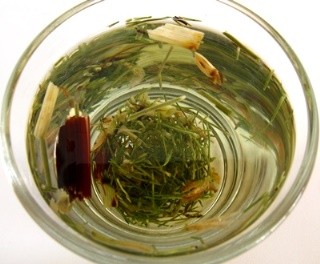
As an herbal tea taken internally, a horsetail infusion may deliver silica and calcium to your body all the way to the roots of your hair.
This nourishment may be at the source why this tea may help prevent hair loss in general and in particular during menopausal stages.
Additionally, you may use it as a rinse when you wash your hair, applying it while massaging the scalp to stimulate blood flow and reduce skin irritation, all the way down to the very tips in order to help moisturize each strand as well as stop ends from splitting as much.
Find out more about this and other benefits of this herbal tea here.
Lavender
(lavandula angustifolia or lavandula officinalis)
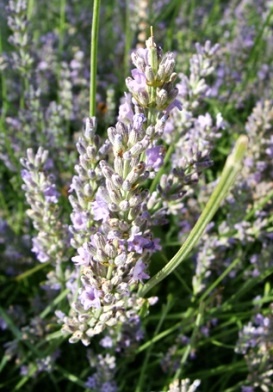
This Mediterranean herb may do more for your hair than make it smell nice. Massaging your head with a lavender tea rinse may also prevent hair loss as well as provide a soothing and cleaning action when in the presence of dandruff, lice or other irritations.
The great thing about lavender tea is that it tastes wonderfully, too.
This calming infusion, not only soothes nerves that may be causing your hair to fall out, but it may also deliver nutrients important to the production of collagen allowing for stronger hair growth.
Find out more about this and other benefits of this herbal tea here.
Rosemary
(rosmarinus officinalis)
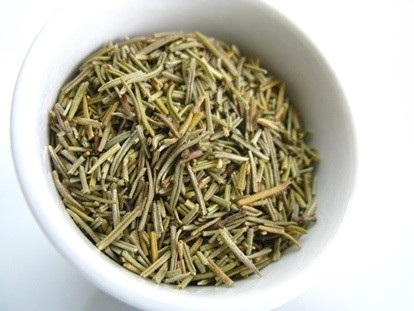
Taken internally, rosemary tea is said to promote blood circulation, boosting among other things, brain function and memory.
It is also said to be rich in iron and antioxidants that help flush out toxins and other harmful agents from your body, making your skin healthier and your hair look nicer.
As a rinse, rosemary tea is said to prevent dandruff and help treat oily hair. The massaging of this infusion on the scalp may help your hair grow strong and prevent premature balding. If your hair is on the darker side, this tea may also help you deal with your first grays.
Find out more about this and other benefits of this herbal tea here.
Sage
(salvia officinalis)
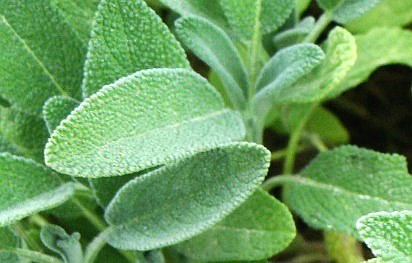
Internally, this herbal tea is said to help women cope with many of the symptoms associated with menopause by delivering essential nutrients that the body has a hard time producing at this stage.
Some of the elements delivered are essential nutrients that may help your hair remain strong and healthy.
Externally as a hair rinse, this infusion may help keep the skin on your scalp clean and disinfected, reducing the risk of dandruff or other skin issues. Applying this tea, may also enhance darker, even coppery, hair, reverting or slowing the graying process.
Find out more about this and other benefits of this herbal tea here.
In conclusion
Keeping your hair healthy doesn’t have to be a tiresome task. Ideally you should have it trimmed regularly in order to prevent split ends and promote healthy growth.
Additionally, you should choose gentle products and avoid styling your hair with instruments that can cause stress and damage to your hair. Test all products, including herbal rinses, on a small area of your skin for possible allergies.
Most importantly, there are many more herbal teas that help your hair stay healthy and strong. Find one that you enjoy and make it a part of your life.
Find more about them here:
Let herbal teas nourish your hair from roots to tips!
What’s Next?
More articles about tea are coming, so keep on the lookout for the next issue of our newsletter. While you wait, look around our website and learn more about tea and its health benefits.
Until then make sure to follow us on Facebook for daily tips and other wonderful tea related items.
Follow us also on Pinterest!
Comments / Suggestions
If you have any comments or suggestions regarding this newsletter or anything you would like to see on the website, make sure to contact us using the form you will find here:
Search Website:
Be healthy
with a wide
choice of herbs!

Prepare your tea!
Try these
Tea Samplers!

Wellness Pack at ArtofTea.com

Award Winning Pack ar ArtofTea.com
Find other
tea time items at ...


